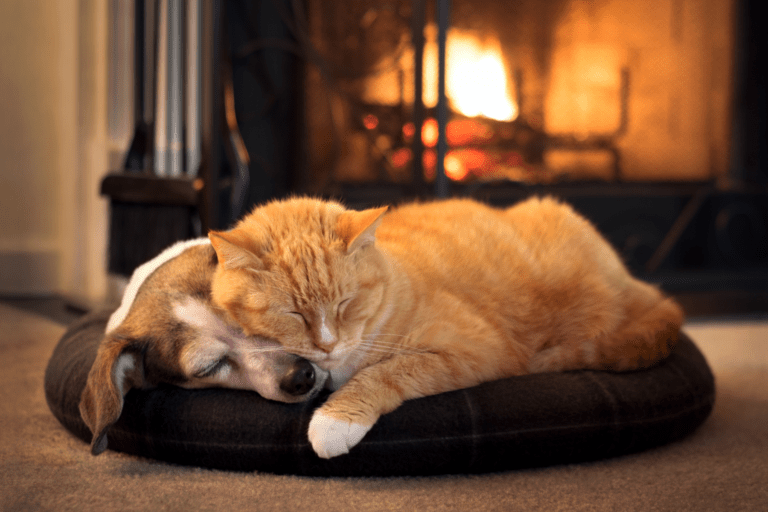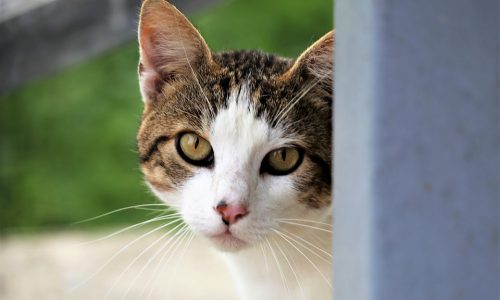Bitter temperatures, roaring winds, rain, ice and snow are all coming to the Miami Valley very soon. The forecast is predicting some extremely frigid winter weather upon us. With the forecast being so severe it is important to plan ahead to keep your pets safe as the temperatures drop. Here are just a few quick tips to keep in mind when it comes to your pet’s safety during this inclement weather.
Battle Cold Weather
With the exception of periods of exercise, we recommend you keep your pets indoors as much as possible. This will protect them from the winter elements and help to avoid the potential risk of hypothermia. Consider dressing your pet in a sweater or wind-proof jacket for outdoor activities. This will help them retain their body heat and will also prevent their skin from drying out. Whenever your pets go outdoors, you need to also protect their paws as much as possible. Booties can help lower your pet’s exposure to painful salt crystals and other ice-melting elements. If booties aren’t an option, try rubbing petroleum jelly into the pads of your pet’s paws before you go out. This will protect your pet from salts and other chemicals. If your pet is continually lifting up their paws in discomfort, it may be a sign that the pads on their feet are getting too cold and they should go back inside. When you bring them indoors wipe off their paws with a dry towel immediately, making sure to pay attention to between their toes.
Provide Proper Shelter
Although we recommend all animals stay indoors, the sad truth is many are outdoors even in the cold. If your pet must be outdoors, provide them with well-equipped shelter. You want a shelter that is dry, draft-free and large enough for your pet to turn around, sit and lie down comfortably. Also, avoid placing blankets or towels in shelters when it is cold. These items absorb the wetness and actually can harm pets more than keep them warm. Instead, use straw in shelters. This helps circulate air, stays dry and adds warmth and padding to your pet’s house.
Keep Pets Nourished
Did you know that in the winter months pets tend to use more energy to stay warm? Make sure to feed your pets a little more food during the winter and give them plenty of water. This will help them produce the energy they need to stay warmer and will keep them hydrated, which will help moisturize their skin. Routinely check your pet’s water dish to make certain the water is fresh and unfrozen.
Bang Car Hood
Warm engines in parked cars attract cats and small wildlife, which may crawl up under the hood for warmth. To avoid injuring animals, bang on your car’s hood to scare them away before starting your engine.
Groom Your Pets
Animals with longer coats tend to have issues with salt crystals, snowballs or even de-icing chemicals clinging to their fur, which can dry your pet’s skin out. Keep fur trimmed to stop some of this from collecting on your pet. Don’t forget to also clip the hair between their paws. By also brushing your pet frequently, you can stimulate blood circulation, which improves your pet’s overall skin condition. You do however want to also limit the number of baths you give your pets during the winter months. Washing too often can remove the essential oils your pets need to keep their skin healthy. Your vet can recommend a good moisturizing shampoo or rinse for you to use on your pets to help their skin.
Avoid Salt and Chemicals
Keep paws free of salt and other winter chemicals. The salt and chemicals used to melt snow and ice can irritate the pads of your pet’s feet. Wipe the feet with a damp towel before your pet licks them and irritates his or her mouth, too.
Avoid Leaving Them in Cars
Just like in the summertime when we recommend never leaving a pet alone in a hot car, we also never recommend leaving them alone in an extremely cold car. A car can almost act as a refrigerator in severe cold temperatures, this can be very harmful for your pets and can put them at risk of hypothermia if left alone in the cold car for too long.
Keep Antifreeze Out of Reach
Antifreeze is a deadly poison, but it has a sweet taste that may attract animals. Wipe up spills and store antifreeze where it cannot be accessed by pets. If your pet does ingest even the smallest bit of antifreeze, contact your veterinarian immediately or call the ASPCA’s Poison Control line at 888-426-4435.
Use a Leash
When you are walking your dogs, especially near bodies of water, make sure to have them on their leash. It is important to be very aware of your surroundings when near ponds, lakes, rivers or even swimming pools. A loose dog can easily run onto ice thinking it is a solid surface and fall through the water. If your pet does fall into the water, do not run after them as you could be putting yourself in danger too. Call 9-1-1 or go find help. If you have a swimming pool, make sure it is securely covered and make sure to monitor your pets in the backyard to ensure they don’t get too close to the pool when they are outside.




